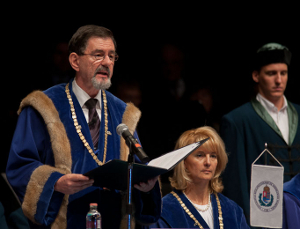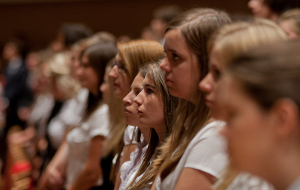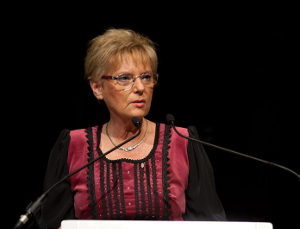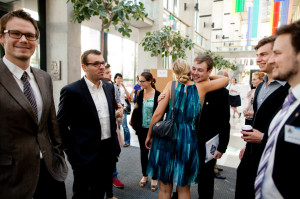 “Let there be mutual respect and cooperation between professors and students! In addition to teaching and learning, let outstanding research activities abound at our university as well! Let all our activities be permeated by the greatest possible feeling of responsibility and sacrifice towards the lives that have been entrusted to us!” Dr. Ágoston Szél, rector of Semmelweis University started the first-year students on their journey with these principles, taken from such great predecessors as Archbishop Péter Pázmány, Queen Maria Theresa, Loránd Eötvös, and Ignác Semmelweis. As Rector Szél said, he is really counting on the students’ faith and determination, and trusts that all of the Hungarian students will hold their own in Hungary.
“Let there be mutual respect and cooperation between professors and students! In addition to teaching and learning, let outstanding research activities abound at our university as well! Let all our activities be permeated by the greatest possible feeling of responsibility and sacrifice towards the lives that have been entrusted to us!” Dr. Ágoston Szél, rector of Semmelweis University started the first-year students on their journey with these principles, taken from such great predecessors as Archbishop Péter Pázmány, Queen Maria Theresa, Loránd Eötvös, and Ignác Semmelweis. As Rector Szél said, he is really counting on the students’ faith and determination, and trusts that all of the Hungarian students will hold their own in Hungary.
In his ceremonial address, which Rector Szél described as being, to a certain extent, a rector’s creed as well, he emphasised: the primary task of a university is education. “The universitas is an ensemble of masters and students, or, in the words of Kúnó Klebelsberg, Minister of Culture between the two world wars, a ‘collective’ whose members, working in various scientific fields, devote all their efforts to acquiring and transmitting the latest knowledge to each other. This is a very important notion: they transmit the knowledge to each other. A good student plays an active role in the educational process: she poses questions to her master, thus prompting him to think further and expand upon his existing knowledge while, as a member of the Students’ Scientific Association or as a Ph.D. student, she acquires new knowledge through her research work, which also enriches her master and Alma Mater,” he said.
 In his opinion, we need to “investment increasingly more in higher education, research, and innovation, as the nation’s development and advancement is essentially determined by its intellectual potential. Recovery from the current economic crisis is inconceivable without a multitude of cultivated individuals”.
In his opinion, we need to “investment increasingly more in higher education, research, and innovation, as the nation’s development and advancement is essentially determined by its intellectual potential. Recovery from the current economic crisis is inconceivable without a multitude of cultivated individuals”.
Rector Ágoston Szél concluded his speech with an admonition by Péter Pázmány, which speaks to master and student alike: “Fear God, study diligently, and faithfully serve your nation, your homeland”.
Dr. Rózsa Hoffman, Minister of State for Education, graced the event with her presence. In her speech, she pointed out that nearly a quarter of Semmelweis University’s students are from abroad, which is a tangible acknowledgement of the University’s high standards.
 The Minister of State stated that, from her standpoint, it is “neither sustainable, nor moral, nor economical, nor just, that a nation’s taxpayers have the taxes deducted from their wages used to train thousands of young people who, without even waiting for the ink on their diplomas to dry, take advantage of their freedom and generate profit from the knowledge acquired and paid for in Hungary, abroad.” She added that the state will, however, finance the studies of those students who, following graduation, spend 10-12 years healing people at home, and will also assume the student loans of those doctors who make their career in the public sector. In her view, these offers are “sustainable, moral, economical and just for both parties. One just has to take advantage of them.”
The Minister of State stated that, from her standpoint, it is “neither sustainable, nor moral, nor economical, nor just, that a nation’s taxpayers have the taxes deducted from their wages used to train thousands of young people who, without even waiting for the ink on their diplomas to dry, take advantage of their freedom and generate profit from the knowledge acquired and paid for in Hungary, abroad.” She added that the state will, however, finance the studies of those students who, following graduation, spend 10-12 years healing people at home, and will also assume the student loans of those doctors who make their career in the public sector. In her view, these offers are “sustainable, moral, economical and just for both parties. One just has to take advantage of them.”
In his speech, Bence Tamás Deák, president of the Faculty of Medicine’s Students’ Union, encouraged the freshers to “be proud of the fact that you are Semmelweis University students! More than a thousand publications are produced within our institution’s walls, and the Semmelweis name has become an international brand that is coupled with the guarantee of quality.” He told the first-year students: “You are not preparing for a profession, but a vocation; so, for you, university is not merely a school, but a mission, the successful completion of which will enable you to take up your calling, both mentally and emotionally. I wish you much faith and perseverance in this mission!”
 In keeping with tradition, the opening ceremony of Semmelweis University’s 243rd academic year was held at the Budapest Congress Center. Each first-year student took the solemn oath in their chosen language of instruction: Hungarian, English or German.
In keeping with tradition, the opening ceremony of Semmelweis University’s 243rd academic year was held at the Budapest Congress Center. Each first-year student took the solemn oath in their chosen language of instruction: Hungarian, English or German.
More than 3400 new students are starting their studies at one of the University’s six faculties this year, an increase of nearly 500 students from the previous year. Over 720 of the total new students are from abroad. Overall, it can be said that the current academic year is starting with maximum capacity; significantly more students have won admission to Semmelweis University’s undivided training programmes that at any time during the past ten years.
Szilvia Tóth-Szabó
Translated by Gina Varga-Gönczi


